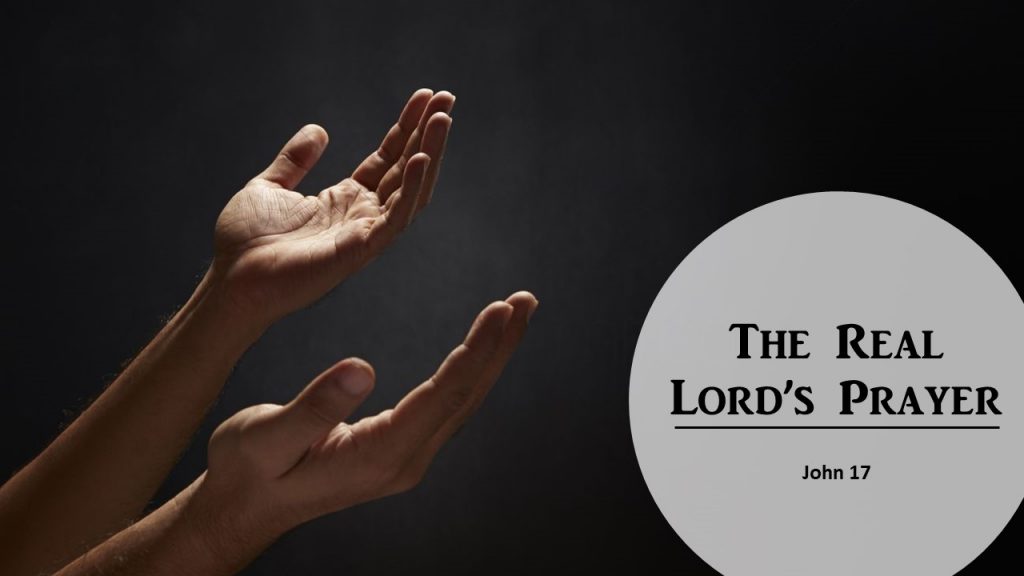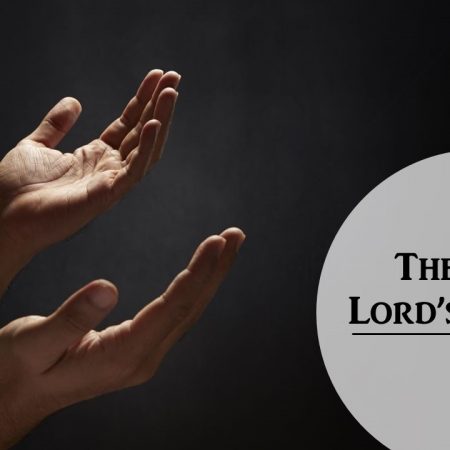
John 17:12-13 “While I was with them, I kept them in your name, which you have given me. I have guarded them, and not one of them has been lost except the son of destruction, that the Scripture might be fulfilled.”
I have pointed out previously that there are actually just two very specific requests made by Jesus in this prayer – “keep them” and “sanctify them”.
The prayer to “keep them” (v11) has three, what we might call, sub-sections:
- keep them in your name (v11)
- keep them…that they may be one (v11)
- keep them from the evil one (v15)
We have looked at the first two of those and will deal with the third when we get to that point in the prayer.
Now, in verse 12, as we move on through the prayer, verses by verse, phrase by phrase, we see a qualifying statement Jesus makes regarding the request to the Father to keep his disciples.
Jesus prays that, now that he is leaving the world and the physical presence of his disciples, that his Father would continue to do for them what he himself has been doing for the past 3 years – keep them.
So, combining verses 11 and 12 he prays, “Holy Father, keep them [as] I have kept them”. The verb is the same in both cases and has the idea of surveillance, of standing guard over something, or preserving it.
Then, in v12 he uses another verb to describe what he has been doing while on earth. He says, “I have guarded them”. This adds something new and encouraging. This second word gives us a double sided picture of the work of God in preserving his people. It’s a picture of a guard and a shepherd.
First, the guard. The Greek word that Jesus uses here means to guard, to protect. It’s used, for example, in 2 Corinthians 11:32 where Paul says that while he was in Damascus, “…the governor…was guarding the city of Damascus in order to seize me”.
Then, in Acts 12:4, Luke tells us that Herod had Peter arrested and put in prison, “delivering him over to four squads of soldiers to guard him”.
In fact the verb that Jesus uses here also appears as a noun; it is the guard who does the guarding; as in Acts 5:23.
But there’s one more usage of this word that I want to show you. Guarding is not only what prison guards do, it’s what shepherds do. Remember the night of the Saviour’s birth in Bethlehem? Luke tells us that, “there were shepherds out in the field, keeping watch over their flock” (Luke 2:8) – “keeping watch over”, or guarding their flock; it’s exactly the same word.
You know, those two roles – the guard and the shepherd – give us a double assurance of our security as believers. You see, Jesus goes on to say, “I have guarded them, and not one of them has been lost”, except, of course, Judas, and we’ll consider him next time, God willing.
How is that that, because Jesus has kept and guarded his disciples, not a single one of them has been lost? Well, the answer is that Jesus keeps them, watches over them like a guard, so they can’t wander off and get lost, and he guards them, he protects them so that not only can they not wander off and stray, neither can they be endangered by dangerous enemies. In many ways, the role of the shepherd combines both those roles. He keeps them and he keeps them from danger.
Friends, that was true of each of the disciples for the three years Jesus spent with them and, as a result of his constant and unceasing keeping and guarding, not one was lost.
By the way, as we will see next time, God willing, Jesus isn’t saying that he managed to keep 11 out of the 12. The prison guard isn’t responsible for a prisoner that hasn’t been entrusted to his care, nor is the shepherd responsible for the safety of a sheep that belongs to another flock.
But, and here’s the direct relevance and application for us today; what was true of the first group of disciples is also and equally true of every true disciple since then. We are kept by the power of God – Father, Son and Holy Spirit – kept from straying and kept from danger – and without that keeping and guarding, nothing is more certain than this – we would be lost, and lost for all eternity.
2 Thessalonians 3:3 – “Finally, brothers, pray for us, that the word of the Lord may speed ahead and be honored, as happened among you, and that we may be delivered from wicked and evil men. For not all have faith. But the Lord is faithful. He will establish you and guard you against the evil one.” There it is, the same word, guard you and watch over you; keep you and keep you from danger.
And both these truths come together in these wonderful verses in 1 Peter 1:3-5 – “Blessed be the God and Father of our Lord Jesus Christ! According to his great mercy, he has caused us to be born again to a living hope through the resurrection of Jesus Christ from the dead, to an inheritance that is imperishable, undefiled, and unfading, kept in heaven for you, who by God’s power are being guarded through faith for a salvation ready to be revealed in the last time.”
Peter says that our imperishable, undefiled and unfading inheritance is being kept for us – that’s the keep word Jesus uses in John 17. And we, by God’s power, are being guarded for it. Now the word guarded there is actually a different word in the original from the one Jesus used in John 17:12 but it has exactly the same meaning. We cannot lose, friends. Heaven is being kept for us and we are being kept and guarded for it.
Here’s what Matthew Henry says about the way Jesus kept those first disciples of his, that he prays for and with in John 17; and what he says of them is precisely true of us as well.
“While he was with them, he kept them, and his care concerning them was not in vain. He kept them in God’s name, preserved them from falling into any dangerous errors or sins, from striking in with the Pharisees, who would have compassed sea and land to make proselytes of them; he kept them from deserting him, and returning to the little all they had left for him; he had them still under his eye and care when he sent them to preach; went not his heart with them? Many that followed him awhile took offence at something or other, and went off; but he kept the twelve that they should not go away. He kept them from falling into the hands of persecuting enemies that sought their lives; kept them when he surrendered himself.” [1]
And he goes on to explain why this keeping and guarding is so necessary; and it’s just as true of us as it was of them.
“That they are weak, and cannot keep themselves….they are, in God’s account, valuable and worth the keeping; precious in his sight and honourable; his treasure, his jewels.” [1]
What better way could there be to close this short study than to quote Jude’s closing words, where the word “keep” in the English translation is the same word “guard” that Jesus used in John 17:12.
“Now to him who is able to keep you from stumbling and to present you blameless before the presence of his glory with great joy, to the only God, our Savior, through Jesus Christ our Lord, be glory, majesty, dominion, and authority, before all time and now and forever. Amen.”
[1] Matthew Henry’s Commentary On The Whole Bible: Complete And Unabridged In One Volume. Hendrickson, 1994 p2031
